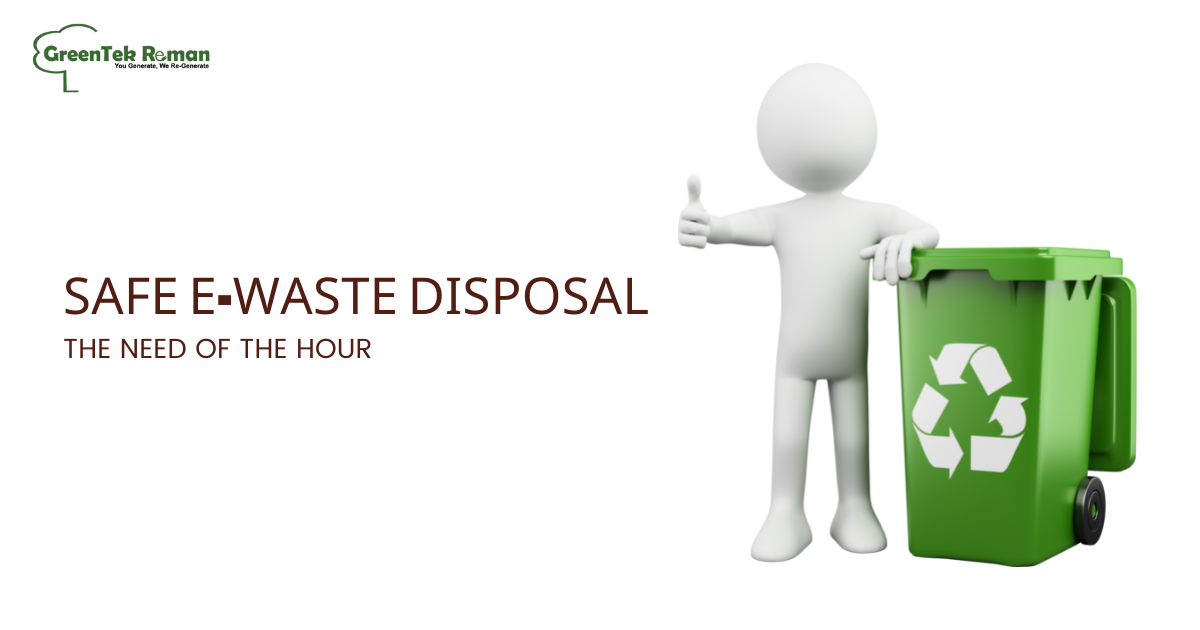What are some of the best E-waste disposal Methods?
Before we dwell into what are some of the best e-waste disposal methods, we must first understand why it is the need of the hour to safely dispose of our e-waste.
What is e-waste?
The International Telecommunication Union defines e-waste as all items of electrical and electronic equipment (EEE) and its parts that have been discarded by its owner as waste without the intent of re-use.
What are the issues related to e-waste?
After the US and China, India has now become the third-largest producer of e-waste globally. According to a report published by the Central Pollution Control Board, India generated 1,014,961.2 tonnes of e-waste for 21 types of EEE during the financial year 2019-2020.
One of the biggest problems that arise from e-waste is the nature of the material. The e-waste system contains a diversity of materials but the most prominent amongst them are hazardous substances like lead, polychlorinated biphenyls (PCBs), polybrominated biphenyls (PBBs), mercury, polybrominated biphenyl ethers (PBDEs), brominated flame retardants (BFRs).
Most of these substances, especially lead is a very highly toxic substance. Lead, on burning releases harmful gases impacting human blood, kidney, and the peripheral nervous system. Lead is even harmful when thrown in landfills as the chemical seeps into the groundwater affecting both the land and sea animals.
Thus, the implementation of safe e-waste disposal methods is the need of the hour.
What are some of the best safe e-waste disposal methods?
Now that we have briefly discussed what is e-waste and why its safe disposal has become the need of the hour, let us discuss some of the best e-waste disposal methods.
1. Don’t throw, recycle:
Data suggests that two out of five Indians replace their smartphones every year. But have you ever wondered what happens to the old phone that you throw away?
Most of them end up in landfills and the toxic chemicals in their battery and circuits end up seeping into the soil and polluting it.
Several cell phone stores, as well as brands, have now started offering recycling programs that not only allow you to safely dispose of your old cell phone but also provide an additional discount on your new purchase.
Therefore, recycling your old devices should definitely be a part of your e-waste disposal methods.
2. Certification Matters:
A lot of times, your e-waste disposal service provider might claim to follow proper e-waste disposal procedures but all they could be doing is simply collecting valuable metals such as gold, silver, copper, etc. found in the e-waste you give them and then dumping the remaining waste in a landfill.
This is not a safe e-waste method, but just as harmful as simply dumping your e-waste in landfills by yourself.
So, in order to ensure this doesn’t happen, always verify that your e-waste management service has proper certifications and follows all protocols of safe e-waste disposal methods.
3. Keep your data safe:
One of the biggest reasons why people prefer not to give up their e-waste for disposal is the fear of losing their precious data. In order to avoid this, several e-waste management companies are now providing data backup services to ensure your data is safe.
ITAD companies allow you to safely backup your data before taking away your devices for safe disposal. Thus, ensuring your e-waste management company provides ITAD services should definitely be a part of your e-waste disposal methods.
4. Reverse Logistics:
If you are a business providing IT products, one of the biggest challenges you face when it comes to e-waste management is collecting your e-waste. But several e-waste management companies provide you with reverse logistics services to ensure your e-waste is collected responsibly and safely.
So, outsourcing your reverse logistic services to collect e-waste should be a part of your e-waste disposal methods.
5. EPR Services:
Extended Producer Responsibility services, is a policy approach under which producers are given a significant responsibility – financial and/or physical, for the treatment or disposal of post-consumer products. This has been shown to significantly reduce e-waste production.
As a producer, it becomes difficult to keep a track of your EPR services. Thus, as a part of e-waste management methods, it is always smart to outsource your EPR services to companies that specialize in them.
Thus, now you know some of the best e-waste disposal methods. If you are looking to get some advice or avail of e-waste management services, you can get in touch with our team of experts for consultation at GreenTek Reman


